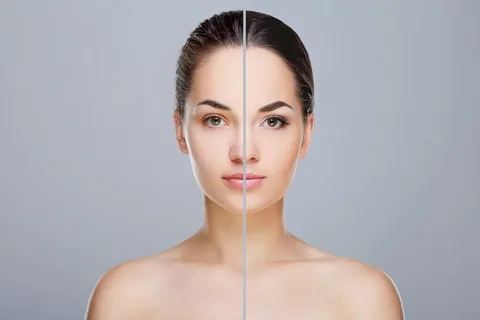How to Even Out Skin Tone: Your Go-To Guide for a Smoother, Radiant Complexion
How to Even Out Skin Tone: Your Go-To Guide for a Smoother, Radiant Complexion

Uneven skin tone can be frustrating, right? It’s like you’re trying everything, but those dark patches, redness, and spots just won’t budge. Don’t worry – you’re not alone, and there are actually some easy, effective ways to even out your skin tone without going overboard.
In this guide, we’ll dig into the real, practical tips for how to even out skin tone, covering everything from the top skincare ingredients to simple daily habits that make a difference. This isn’t about some wild, unrealistic routine – it’s about straightforward, do-able steps that’ll help you see genuine results.
Why Is My Skin Tone Uneven?
If you’re dealing with an uneven skin tone, you might be wondering what’s causing it in the first place. Here are the main reasons why skin tone gets a bit out of balance:
- Sun Exposure: UV rays are one of the biggest causes of dark spots and patches.
- Hormones: Changes in hormones, especially during pregnancy or menopause, can lead to patches of discolouration known as melasma.
- Aging: As we get older, our skin naturally shows more signs of sun exposure and lifestyle.
- Post-Inflammatory Hyperpigmentation (PIH): Any trauma to the skin, like acne or cuts, can leave behind dark marks.
Each of these factors messes with melanin – the pigment that gives your skin its colour – and creates areas of darker or redder skin. So, knowing what’s behind the problem can really help when it comes to choosing the right solution.
The Essentials: Building a Routine to Even Out Skin Tone
Ready to even out that skin tone? Let’s look at the best, proven steps.
1. Sunscreen – Your Everyday Essential
If you only make one change to your routine, make it this: use sunscreen daily. Why? Because the sun makes pigmentation issues worse, and prevention is half the battle.
- Choose SPF 30 or Higher: Look for broad-spectrum protection to block both UVA and UVB rays.
- Mineral-Based Sunscreens: These are gentler on sensitive skin. Look for zinc oxide or titanium dioxide in the ingredients.
- Apply and Reapply: Slather it on each morning, and reapply if you’re spending a long day outside.
Sunscreen not only helps prevent future dark spots but also protects any progress you make with other treatments.
2. Exfoliate Regularly – But Gently
Exfoliating is crucial for evening out skin tone because it helps remove dead skin cells and allows fresher, brighter skin to shine through. But it’s all about finding a balance.
- Chemical Exfoliants: Ingredients like glycolic acid or lactic acid gently dissolve dead skin, revealing smoother skin beneath.
- Physical Exfoliants: These are scrubs with tiny particles, but avoid anything too gritty. You don’t want to irritate your skin further.
- Weekly Routine: Start with exfoliating once or twice a week to see how your skin reacts. Gradually increase to three times a week if your skin can handle it.
Over-exfoliating can actually make uneven skin tone worse, so it’s key to be gentle and consistent.
Adding Brightening Serums to Your Routine
Brightening serums are a great way to target those darker areas and give your skin an all-over glow. Here are some of the best ingredients to look for:
Vitamin C – The Antioxidant Superstar
Vitamin C is a must-have for brightening. It not only fades dark spots but also fights free radicals that can cause skin damage.
- Apply in the Morning: After cleansing, apply a few drops of a vitamin C serum to clean, dry skin.
- Pair with Sunscreen: Vitamin C and sunscreen are like best mates – they both work better when used together.
- Results Over Time: Vitamin C works gradually, so give it a few weeks to see the full effects.
Niacinamide – Great for Redness and Dark Spots
Niacinamide (also known as vitamin B3) is brilliant for evening out skin tone. It helps with dark spots, redness, and also calms the skin.
- Use Day or Night: Niacinamide is a gentle ingredient, so you can use it morning or night.
- Mix with Moisturiser: Many moisturisers now contain niacinamide, so you don’t always need a separate serum.
- For Sensitive Skin: If you find vitamin C too strong, niacinamide is a gentler alternative.
Kojic Acid and Licorice Extract – Natural Brighteners
If you prefer a natural option, kojic acid and licorice extract are both known for their ability to lighten dark spots.
- Kojic Acid: Often found in brightening serums, this ingredient can fade dark patches without irritating most skin types.
- Licorice Extract: This is a mild brightener that can also help reduce redness, perfect for those with sensitive skin.
Hydrate, Hydrate, Hydrate!
You can’t underestimate the power of a good moisturiser. Dry skin can make uneven patches look worse, so keeping your skin hydrated is a must.
Look for These Hydrating Ingredients
- Hyaluronic Acid: Draws moisture into the skin, making it plump and smooth.
- Ceramides: Strengthen the skin barrier, which can reduce the look of uneven tone.
- Glycerin: A simple but effective ingredient that helps keep skin hydrated and soft.
A well-hydrated face will naturally look more even-toned, so make sure your moisturiser is up to the job.
The Power of Retinoids for Long-Term Results
Retinoids are all about long-term results. They help speed up cell turnover, which means dark spots and patches fade faster.
How to Get Started with Retinoids
- Start Low: Begin with a low-strength retinoid, like retinol, to avoid irritation.
- Apply at Night: Retinoids make your skin more sensitive to sunlight, so they’re best used before bed.
- Always Follow with SPF: Retinoids increase your skin’s sensitivity to the sun, so protect it with sunscreen in the morning.
Retinoids can be intense, so ease them into your routine slowly and see how your skin reacts.
FAQs on Evening Out Skin Tone
How often should I exfoliate?
Start with once a week and build up to two or three times if your skin can handle it. Over-exfoliating can irritate the skin and make it look worse.
Can I use natural remedies alongside my skincare products?
Yes! Just make sure to patch-test new ingredients first to check for reactions.
How long does it take to see results?
Most ingredients, like vitamin C and retinoids, take a few weeks to a couple of months for noticeable results.
Does SPF really matter that much?
Absolutely! Sunscreen is essential for protecting your skin and preventing further pigmentation.
Final Thoughts
Achieving an even skin tone isn’t about perfection. It’s about small, consistent steps that make a big difference over time. The most important part is to start simple: sunscreen, gentle exfoliation, and a brightening serum. Everything else is just a bonus!
Be patient and kind to your skin, and you’ll see the results you’re after. Stick to what works, protect your skin, and let it shine.



